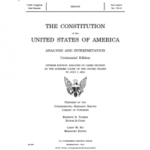When does the First Amendment allow the government to limit speech? Many Americans struggle with understanding the language and subsequent interpretation of the Constitution, especially when it comes to the rights encapsulated in the First Amendment. While many Americans can agree that speech should be protected, there are disagreements over when, where, and how speech should be limited or restricted. This lesson encourages students to examine their own assumptions and to deepen their understanding of current accepted interpretation of speech rights under the First Amendment, including when and where speech is protected and/or limited. It should reinforce the robustness of the First Amendment protections of speech.
Second Amendment
Students will be able to trace the historic development of the Second Amendment with help from the Common Interpretation in the Interactive Constitution and matters of debate essays, and use evidence from the readings to explore the modern interpretation of the Second Amendment.
Constitution of the United States of America: Analysis and Interpretation

Popularly known as Constitution Annotated, this Senate Document encompasses the U.S. Constitution and analysis and interpretation of it, with in-text annotations of cases decided by the Supreme Court of the United States. What began as an inclusion of the 1911 Senate Manual, is now almost 3,000 pages, and references more than 6,000 Supreme Court cases. The online version is updated regularly as new Supreme Court cases are decided. You can search or browse Constitution Annotated.
A Conversation on Judicial Interpretation
Justices Stephen G. Breyer and Antonin Scalia and a group of students discuss the different theories, primarily Originalism vs. The Living Constitution, of how to interpret and apply the Constitution to cases. A PDF lesson guide accompanies this video
Grade 9-12 Methods of Interpreting the Constitution
The purpose of this lesson is to explain the two overarching modes of constitutional interpretation, strict and loose construction, and their use and application to particular Supreme Court cases. After an in-class investigation activity to explore the methods of interpretation, students will be given the opportunity to express their opinions of the merits and limitations of each method during a mock Supreme Court session where students will revisit two Supreme Court opinions.
Curating the Slave Quarters
This lesson plan encourages students to analyze and use evidence from diverse sources to act as curators and create an interpretation plan for the Greenhouse Slave Quarters at Mount Vernon.
We the People Open Course
This course takes you from the philosophical foundations of the U.S. Constitution through the modern interpretation and application of its ideals. You will find videos of noted scholars explaining key aspects of the Constitution and online exercises to check for understanding. The course follows the We the People: The Citizen & the Constitution Level 3 (high school) textbook, which has been used throughout the country to further understanding of our government and its fundamental principles.
The American Presidency: Core Documents
This collection of documents on the presidency begins with Alexander Hamilton’s commentary on the sections of the Constitution related to the executive branch and ends with President Barack Obama’s address to the nation defending his interpretation of executive authority under the Constitution to use force against the Syrian regime. The documents cover the executive’s role and the specific topics of presidential selection, term limits, and impeachment.
The Constitution in Action: Strict vs. Loose Construction
History is the chronicle of choices made by actors/agents/protagonists in specific contexts. This simulation places students in the Early Republic and asks them to engage with questions of Constitutional interpretation faced by President Washington and the First Federal Congress. Did the Constitution empower Congress to charter a national bank? Finance and maintain lighthouses? Regulate working conditions of merchant seamen? Support higher education?
The U.S. Constitution and the Concept of Originalism
Pulitzer Prize winning historian Jack Rakove of Stanford discusses the U.S. Constitution and the concept of originalism, or how true we should constrain ourselves to the original meaning of the Constitution.